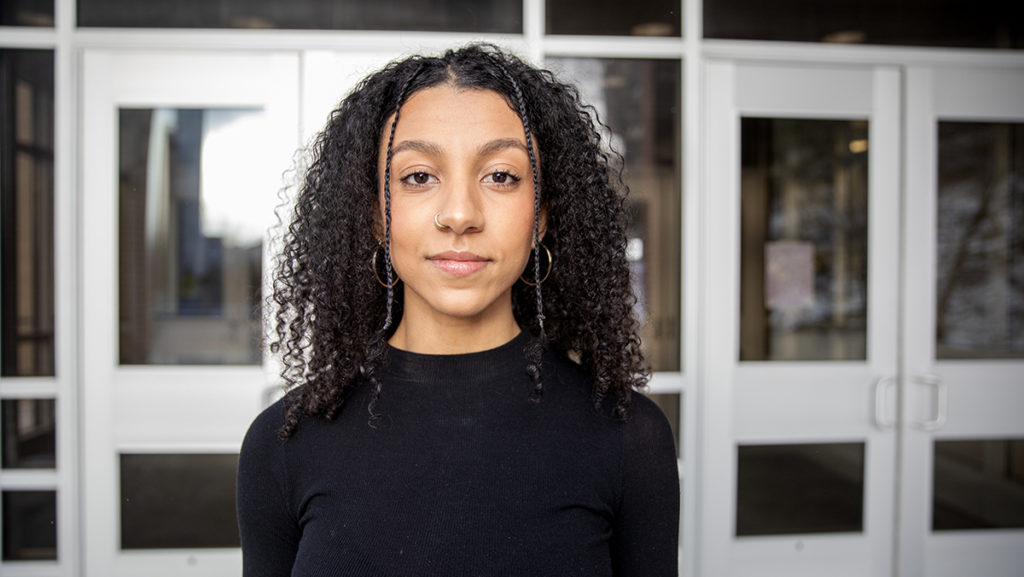On Feb. 18, Ithaca College senior Stephanie Monteiro performed in her senior recital in Hockett Family Recital Hall, where she used her performance to celebrate her Brazilian heritage, as well as shed light on the historical oppression of Brazilian people.
Monteiro is a music major with an outside field in voice. She said she attended a summer program in Barcelona after her first year at the college that helped her connect her Brazilian heritage to her passion for musical performance. She said she decided to use her senior recital as an opportunity to share Latin-American music with the college community.
One topic Monteiro addressed in her recital was the 1964 Brazilian coup d’état, in which the U.S. supported and funded the overthrow of Brazilian President João Goulart. The successful military coup against the leftist and alleged communist president led to a 20-year military dictatorship.
Contributing Writer Maddy Vogel spoke with Monteiro about how she uses music as a way to connect with her heritage and speak out against social injustices.
This interview has been edited for length and clarity.
Maddy Vogel: What were the inspirations behind your performance?
Stephanie Monteiro: My parents are both Brazilian immigrants and I’m from Marlborough, Massachusetts. My parents would talk about their time growing up in Brazil, but there are a lot of details that they left out, or that they didn’t want to talk about, even when I would ask because they were growing up in a dictatorship. At the beginning of my time in Ithaca, I worked with a lot of classical music. I thought these artists were the geniuses, the foundation of all music, and that definitely all just stemmed from white supremacy and elitism. I learned through a summer program in Barcelona that Europe was not the only place making music. Of course, it existed, it’s just that nobody ever talks about it ever. The woman who started the program was just such a huge inspiration to me and helped me discover more Latin-American music. The rhythm and the feel and the poetry of this music, it really just connected with me. It felt like it was a part of me.
MV: How did you bring your ideas for the performance to life?
SM: I became friends with a lot of jazz majors and a lot more people who were doing not just classical music. I wanted this recital to be something special. This is my last semester here, and I just didn’t want to leave college, only having done classical music because it is just the tiniest fraction of all the music that’s in the world. I found artists that my family recommended to me that I really connected with, and discovered songs by them that actually wrote about the Brazilian dictatorship under the veil of religion because talking about the government was illegal at the time. I found artists at Cornell who would perform with me and I asked my friends and peers for advice on background vocals. I had to just kind of throw myself into it and do my best, and I struggled, but luckily I had my friends around me that helped me, and I had a couple of professors help me as well.
MV: In what ways did you speak on Brazilian oppression through your performance?
SM: In one of my journalism classes, I’m learning about how the U.S. really wanted to turn mixed economies across the world, but especially Latin America and Central America into a completely free market. [I speculate that] the U.S. wanted to tear other countries down in order to be an empire, but it was also about money. It was just about getting the rich, even richer. I wanted to talk about how the U.S. and the CIA funded and supported this. I spoke about this to the audience during my performance. I gave my audience a book that they could read if they were interested in learning about it more. I also performed some of the songs that wrote about the Brazilian dictatorship under the veil of religion.
MV: How do you hope your performance connected with your audience?
SM: I just wanted my audience to know that in this country, we don’t learn about the U.S. role in foreign dictatorships at all. In all other countries in the world, they learn about what neoliberalism is, and they learn about what happened in these dictatorships, and they learn that the U.S. played a massive part in it. I’m really into activism and this is a big part of who I am. And I know the fear that my family, their parents and all of those innocent people were living in, was just completely undeserved. And it was all for money. People just need to know.
Editors note: At the request of Stephanie Monteiro the words in brackets “[I speculate that]” have been added to the sentence: “The U.S. wanted to tear other countries down in order to be an empire, but it was also about money.”








